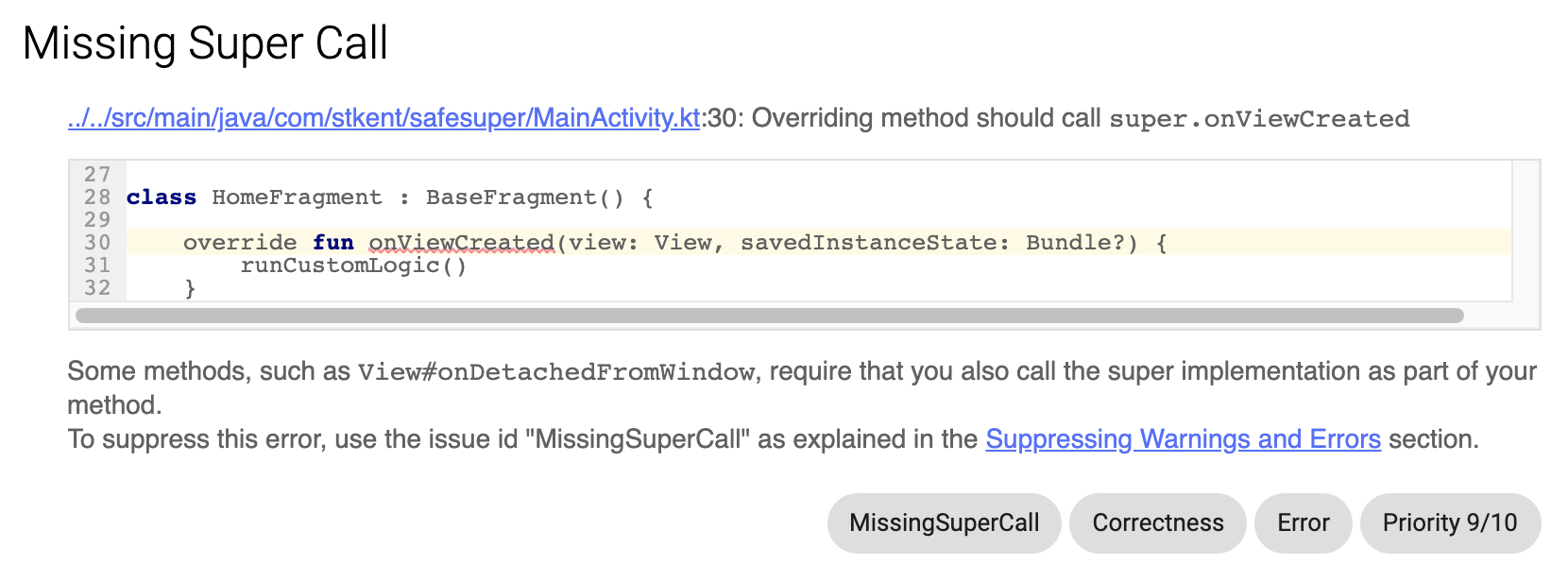Two Ways To Avoid Skipping Super
Most Android apps that I’ve worked on have included a BaseFragment that contains universal logic. This logic is often written within one or more lifecycle methods, creating an implicit contract: subclasses must call through to super if they override any of these lifecycle methods1.
We can make this contract harder to accidentally break in a couple of different ways.
The @CallSuper Annotation
The @CallSuper annotation is one of many Android Support Annotations. When added to a method declaration, it signals that any overriding implementation should include a call to super:
// in BaseFragment:
@CallSuper
open override fun onViewCreated(view: View, savedInstanceState: Bundle?) {
super.onViewCreated(view, savedInstanceState)
runUniversalLogic()
}
If an overriding implementation fails to call super:
// in HomeFragment, extends BaseFragment:
override fun onViewCreated(view: View, savedInstanceState: Bundle?) {
runCustomLogic()
}
then Android Studio will show an inline warning:

This warning will not prevent you from compiling and running your application. Whether or not this is a good thing depends on your build process and personal preferences.
This warning will be flagged as a lint error with priority 9/10:

Android Support Annotations are used extensively within Android’s own AndroidX libraries, so they are probably already available for you to use in your own project (no new dependency needed).
The Template Method Pattern
The template method pattern allows us to enforce our implicit contract even more strongly. In this pattern, the method containing universal logic is marked final so that it can no longer be overridden by subclasses. Calls to one or more empty “template methods” are then inserted into the final method for subclasses to override instead. This allows subclasses to add to (but never skip or erase) superclass logic:
// in BaseFragment:
@CallSuper
final override fun onViewCreated(view: View, savedInstanceState: Bundle?) {
super.onViewCreated(view, savedInstanceState)
runUniversalLogic()
afterViewCreated(view, savedInstanceState)
}
open fun afterViewCreated(view: View, savedInstanceState: Bundle?) {
// Template method, intentionally left blank.
}
// in HomeFragment, extends BaseFragment:
override fun afterViewCreated(view: View, savedInstanceState: Bundle?) {
runCustomLogic()
}
Attempting to override BaseFragment::onViewCreated directly will cause your application to fail to compile. The price paid for this safety is the reduced discoverability of the template method. Folks are very familiar with the names of built-in lifecycle methods and are used to overriding them; afterViewCreated is not a standard lifecycle method name and it may take a few minutes for others to locate it and understand its purpose. This friction can be reduced by choosing template method naming conventions and applying them consistently across your codebase.
Summary
It is a good idea to make implicit contracts explicit. This post describe two approaches for making “must call super” contracts more explicit in Android codebases. Picking either is safer than picking neither. Talk with your team to determine which best suits your needs.
-
This type of contract can also exist between non-lifecycle methods and between non-framework classes. The approaches in this post apply to these situations too. ↩